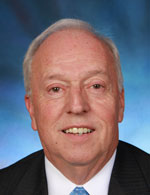Ephesians 4 provides one of the most comprehensive explanations about unity in the church. Verses 11-12 form the theme of this month’s issue focused on “Equipping the Saints.”

Chip Hutcheson
Pastors, elders, deacons, Sunday school teachers — the challenge is to equip God’s people with knowledge about Him, what He has commanded and what He expects of them. This matter of equipping is intended for the entire church family — to help each person grow in faith through a stronger and deeper relationship with Christ.
These verses tell us — in no uncertain terms — that we are to equip people so that they not only can articulate why they are following Christ, but they can tell others about their need of the Savior. When the church body is equipped, all sorts of false worldly ideas dissipate. Unity results because all are focused on pleasing the Savior and seeking His will in their lives and in the framework of the church. Too, when people are equipped, it pushes back the darkness in our world. We read in the New Testament how new believers are susceptible to false doctrine and the schemes of Satan. Equipping the saints means we provide the arsenal needed to fight against the forces of darkness.
Karl Vaters writes that teaching requires a competent instructor and receptive students. But he goes on to say that equipping and discipling require much more.
For instance, someone can teach people they don’t know. That can happen by a Facebook Live sermon or devotional or by a blog post that a friend forwards to you. But equipping the saints involves more than just giving someone information. A deliberate relationship is needed. The person being mentored and the person doing the mentoring are willing to be open with each other, voicing their true feelings, concerns, questions and doubts without fear of judgment from the other person.
The mentor acknowledges a lack of perfection, yet the successful mentor must serve as a good role model. That stems from the admonition in Luke 6:40: “A disciple is not above his teacher, but everyone when he is fully trained will be like his teacher.” We see that evidenced through many biblical examples. We see that in the life of Moses and Joshua, in Elijah and Elisha and with Paul and Timothy.
Certainly Jesus is the perfect example of someone who equipped His disciples — He showed by example how to pray, how to love your enemies, how to esteem others, how to be compassionate and how to be faithful in times of great distress.
We read how Jesus gave assignments at various times to the disciples, and He held them accountable for their obedience to those instructions. In equipping the saints for ministry, we must do that as well. Teaching someone is important, but it is imperative to watch how they put that teaching into use for the kingdom.
There are those in our churches who don’t place a priority on equipping or discipling. I encourage you to look at Acts 5 — there you see a multitude of sick and afflicted being brought to Peter to be healed. The crowd swelled so much that some wanted to just touch Peter’s shadow so they may be healed.
That begs the question for each of us — who has been impacted positively for the kingdom by your shadow? If your soul was required of you today, is there anyone who could say he or she has grown in the grace and knowledge of the Lord as the result of your life and witness and deliberate involvement in a person’s life?
There’s no better time than now to consider how you can invest your life and who you can equip to be a more faithful servant of the Lord. Don’t take that responsibility lightly.
Chuck Lawless cautions any mentor to be alert in the process of mentoring someone in the faith.
First and foremost, you must put on the full armor of God yourself. Why? Because when you start investing in others, be assured that the adversary is not happy and will wage spiritual warfare against you. Also, prepare for this work by constant prayer. Pray that you will exemplify humility and vulnerability. Pray for God to lay a particular person on your heart, and that God would also work at the same time on the heart of the prospective mentee. And don’t be surprised if that person is someone you might not have expected.
When you consider the disciples Jesus called, would you have included Peter in that crowd? Too often he spoke when he should have kept silent, and he made brash statements that often required a rebuke from the Lord. Yet look at how mightily he was used on the day of Pentecost and throughout the book of Acts. This shows us that God’s ways are not our ways, and we should trust Him to put the right people in our line of sight. And when He does, may we all take that responsibility seriously and be diligent in equipping others.
Chip Hutcheson is interim managing editor of the Western Recorder, the monthly magazine of the Kentucky Baptist Convention. You can email him at chip. hutcheson@kybaptist.org.
Chip Hutcheson